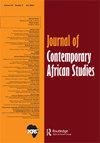The Goof, the Bad and the Ugly: "Indecent" Language Use on Ghanaian Radio
IF 0.8
Q2 AREA STUDIES
引用次数: 1
Abstract
Free speech and media freedoms were reinforced in Ghana with the repeal of the Criminal Libel Law in 2001. As a result, the citizen’s voice, which was hitherto muted, has grown louder as Ghanaians feel emboldened to contribute to national discourse in the media (especially local language radio programmes) without fear of the Criminal Libel Law. However, concerns have been raised about indecent language which has become pervasive in the Ghanaian media. This study examined indecent language on radio in Ghana. The study adopted the quantitative approach and analysed content data gathered from selected Ghanaian radio stations from May, 2016 to September, 2016. This was the period just before the 2016 presidential and parliamentary elections in Ghana. The study revealed six types of indecent language on Ghanaian radio and noted that insults and offensive comments ranked the highest, while expressions promoting divisiveness ranked lowest.傻瓜、坏人和丑八怪:加纳电台的“不雅”语言使用
加纳的言论自由和媒体自由随着2001年《刑事诽谤法》的废除而得到加强。因此,公民的声音从过去的沉默,变得越来越响亮,因为加纳人感到有勇气在媒体(特别是地方语言广播节目)中为国家话语做出贡献,而不必担心刑事诽谤法。然而,人们对加纳媒体中普遍存在的不雅语言表示关注。这项研究调查了加纳广播中的不雅语言。该研究采用定量方法,分析了2016年5月至2016年9月从选定的加纳广播电台收集的内容数据。这是2016年加纳总统和议会选举之前的一段时间。该研究揭示了加纳广播中的六种不雅语言,并指出侮辱性和攻击性言论排名最高,而促进分裂的表达排名最低。
本文章由计算机程序翻译,如有差异,请以英文原文为准。
求助全文
约1分钟内获得全文
求助全文
来源期刊

Journal of Contemporary African Studies
AREA STUDIES-
CiteScore
2.20
自引率
0.00%
发文量
18
期刊介绍:
Journal of Contemporary African Studies (JCAS) is an interdisciplinary journal seeking to promote an African-centred scholarly understanding of societies on the continent and their location within the global political economy. Its scope extends across a wide range of social science and humanities disciplines with topics covered including, but not limited to, culture, development, education, environmental questions, gender, government, labour, land, leadership, political economy politics, social movements, sociology of knowledge and welfare. JCAS welcomes contributions reviewing general trends in the academic literature with a specific focus on debates and developments in Africa as part of a broader aim of contributing towards the development of viable communities of African scholarship. The journal publishes original research articles, book reviews, notes from the field, debates, research reports and occasional review essays. It also publishes special issues and welcomes proposals for new topics. JCAS is published four times a year, in January, April, July and October.
 求助内容:
求助内容: 应助结果提醒方式:
应助结果提醒方式:


